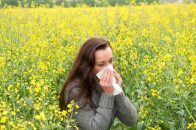Learn to fight against seasonal allergies with these foods.
Summer allergies are here and can cause as severe symptoms for certain individuals as fall and spring seasonal allergies. Summer gives us pollen, mold and insect stings leading to many of the common allergy symptoms that make our daily life difficult.
On the other hand, some foods such as celery, apples, and melons can also cause symptoms of allergies related to food pollen. Seasonal allergies in summer can often be mistaken for colds or other ailments but if allergy symptoms are noticed for more than two weeks, you can infer that it’s not just a cold. Here we’re going to suggest some of the best foods to eat to alleviate seasonal allergies and their symptoms, continue reading to learn more.
Click here to see if there is a link between hay fever and depression.
Seasonal Allergies
Certain summer allergy symptoms come from foods that fall into the cross-reactive foods category. These are foods that cause reactions to the body such as those of birch, ragweed or mugwort. On the other hand, summer allergy symptoms can be considered hay fever and allergic rhinitis that emerge when the immune system reacts to allergens giving symptoms of allergies such as congestion, sneezing, and itching.
In general, seasonal allergies treatment comes from medications that you can buy over the counter at the pharmacy or supermarket but also certain changes such as lifestyle changes can help ease allergy symptoms. Certain foods consumed on a daily or weekly basis can help ease the symptoms of allergies by boosting the immune system and reducing inflammation. Here is our list of foods to try to help reduce allergy symptoms:
- Onions – Yes onions are great! They can act as an antihistamine that can help reduce the symptoms of seasonal allergies. In general, the onions that have the best health benefits are red, white and scallions. They are best when consumed raw, unfortunately leaving you to brush your teeth when finished. They can be added to salads, guacamole and chopped finely on top of meals.
- Ginger – Ginger is a great relief to allergy symptoms because of its natural anti-inflammatory components. Ginger has been used as a natural remedy for many problems over the years and can consume either dried or fresh depending on how you enjoy your ginger.
- Oily Fish – Oily fish such as Salmon that contains omega-3 fatty acids can help with allergy resistance by decreasing the narrowing of airways that is a symptom of asthma and some seasonal allergies. These types of fish should be consumed up to 8 oz a week to ensure that full benefits will be received.
- Bee Pollen – Bee pollen is edible! It’s a mixture of many great things that can provide anti-inflammatory, antifungal and antimicrobial properties. The most important part of consuming bee pollen is that it is locally sourced allowing your body to consume from the environment that it is already used to. It can be eaten in small pellets on top of yogurt, cereal, and drinks.
- Tomatoes – Tomatoes are a great source of vitamin C and other components that are antioxidants and can help with inflammation and in the case of tomatoes when they are cooked the release even more nutrients than when consumed raw.
- Citrus Fruits – Citrus fruits such as oranges, grapefruits, lemons, limes, berries, and sweet peppers are full of vitamin C that can help reduce cold symptoms as well as the symptoms of allergies.
- Turmeric – Turmeric, like ginger, has been used over many years to help as a natural treatment and is known for its anti-inflammatory properties. Turmeric is widely available and can be taken in the form of pills, tinctures, powder or teas. When it is mixed with black pepper or piperine it increases its health benefits tenfold.
Click here to discover tips for chronic allergy relief.
At the end of the day if you suffer from seasonal allergies and would like to try some natural treatment do your research on which may be the best for you and speak to your doctor about any concerns you may have before beginning natural forms of treatment to ensure that its right for you.
To learn more on how to combat seasonal allergies, visit BetterHealthKare.com.

